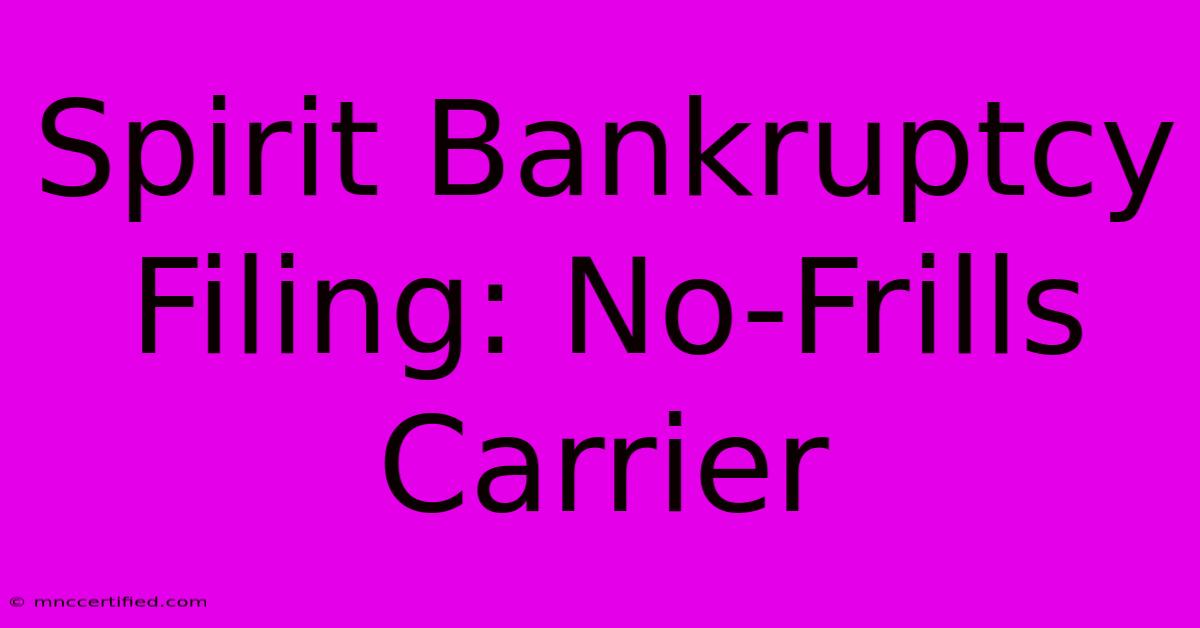Spirit Bankruptcy Filing: No-Frills Carrier

Table of Contents
Spirit Bankruptcy Filing: Navigating the No-Frills Carrier's Financial Troubles
Spirit Airlines, a well-known ultra-low-cost carrier (ULCC), has faced significant financial headwinds in recent years. While not currently in bankruptcy, understanding the possibility of a future Spirit bankruptcy filing is crucial for both investors and passengers. This article explores the potential scenarios, the implications for stakeholders, and what to expect if such a situation were to arise.
Understanding Spirit Airlines' Financial Landscape
Spirit Airlines, like many airlines, experienced a dramatic downturn during the COVID-19 pandemic. Reduced travel demand and stringent travel restrictions significantly impacted revenue. While the airline has seen a rebound in passenger numbers, it continues to grapple with challenges including:
- High fuel costs: Fuel prices are a major expense for any airline, and fluctuations in the global market significantly affect profitability.
- Increased competition: The airline industry is intensely competitive, with established players and new entrants vying for market share. This competition can pressure ticket prices and margins.
- Debt burden: Like many companies, Spirit carries a significant level of debt, making it vulnerable to economic downturns. Managing this debt effectively is crucial for long-term financial health.
- Labor relations: Maintaining positive relationships with employees is vital for operational efficiency and avoiding costly labor disputes.
These factors contribute to a complex financial picture for Spirit, making a future bankruptcy filing, however unlikely currently, a topic worth exploring.
Potential Scenarios Leading to a Spirit Bankruptcy Filing
A Spirit bankruptcy filing wouldn't happen overnight. It would likely be preceded by several warning signs, including:
- Sustained losses: Consistent and significant financial losses, despite attempts at cost-cutting and revenue generation, would be a major red flag.
- Credit rating downgrades: Rating agencies constantly assess the financial health of companies. Repeated downgrades would signal increasing risk and could make it harder for Spirit to secure loans or financing.
- Failed restructuring attempts: If Spirit attempts to restructure its debt or operations but fails to achieve its goals, it could increase the likelihood of bankruptcy.
- Inability to meet debt obligations: Failing to make timely payments on loans or other financial obligations could trigger default and lead to bankruptcy proceedings.
Implications of a Spirit Bankruptcy Filing
A Spirit bankruptcy filing would have significant consequences for various stakeholders:
- Passengers: Passengers with existing bookings might experience flight cancellations or disruptions. Future ticket purchases could be affected depending on the outcome of bankruptcy proceedings. Frequent flyer programs might be impacted, and refunds could be delayed or reduced. The specifics depend heavily on the type of bankruptcy filing (Chapter 7 vs. Chapter 11).
- Investors: Stockholders would likely see a significant drop in the value of their investments, possibly losing a substantial portion of their holdings.
- Employees: Employees could face job losses or reductions in pay and benefits.
- Creditors: Creditors would be in a queue to receive repayment from Spirit’s assets, which may not fully cover their debts.
What to Do If Spirit Files for Bankruptcy
If Spirit were to file for bankruptcy, here's what you should do:
- Monitor official announcements: Stay informed through official Spirit Airlines channels and reputable news sources.
- Contact Spirit Airlines directly: If you have upcoming flights or outstanding bookings, contact Spirit customer service immediately to understand your rights and options.
- Review your travel insurance: Check your travel insurance policy to see if it covers flight cancellations or disruptions due to airline bankruptcy.
- Consider alternative travel arrangements: If your flights are affected, start exploring alternative travel options.
- Consult with a legal professional: If you face significant financial losses or legal issues, seek advice from a qualified attorney specializing in bankruptcy law.
Conclusion: Preparing for Uncertainty
While a Spirit bankruptcy filing is not currently imminent, understanding the potential scenarios and implications is essential. Staying informed about the airline's financial performance and proactively planning for unforeseen circumstances can help mitigate any potential negative impact. The airline industry is dynamic and unpredictable; informed preparation is key to navigating such events successfully. This proactive approach is crucial for both investors and frequent flyers of Spirit Airlines.

Thank you for visiting our website wich cover about Spirit Bankruptcy Filing: No-Frills Carrier. We hope the information provided has been useful to you. Feel free to contact us if you have any questions or need further assistance. See you next time and dont miss to bookmark.
Featured Posts
-
Nfl Giants Replace Jones With De Vito
Nov 19, 2024
-
Knox Jolie Pitt Mom On 2024 Carpet
Nov 19, 2024
-
Analyzing The Russia North Korea Alliance
Nov 19, 2024
-
Watch Croatia Vs Portugal Uefa Nations Live
Nov 19, 2024
-
Trump Dance Trend Why Its Popular
Nov 19, 2024